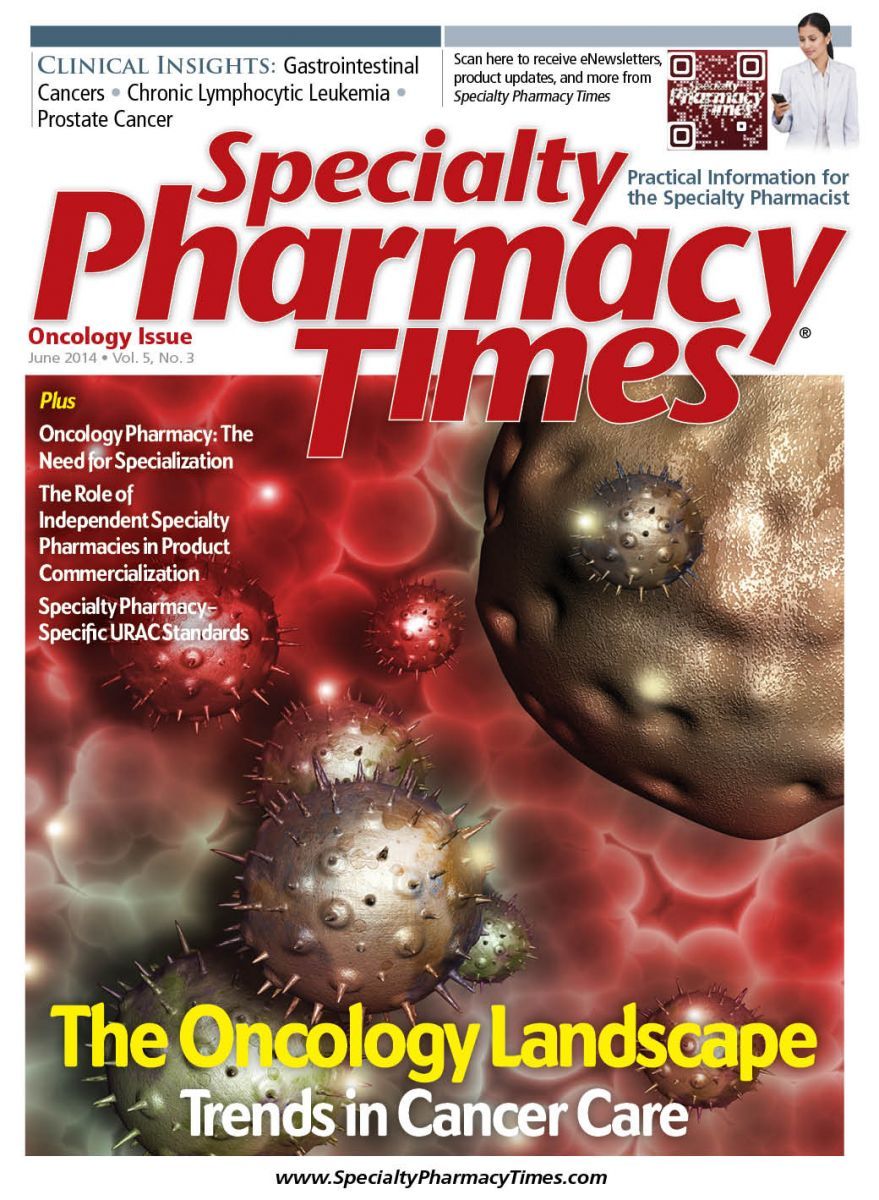Publication
Article
Specialty Pharmacy Times
Trends in Cancer Care
Author(s):
With cancer ranking third among disease states in specialty spending, there is a growing emphasis on programs that focus on cost management and patient adherence to complex medication regimens.
With cancer ranking third among disease states in specialty spending, there is a growing emphasis on programs that focus on cost management and patient adherence to complex medication regimens.
Spending on cancer medications in 2013 increased 24.1% to $36.34 per insured patient from the previous year. In fact, the average cost of an oncology prescription in the pharmacy benefit today is 22 times higher than in 1997, as reported in the Express Scripts Drug Trend Report. The top 10 specialty drugs accounted for nearly 50% of the spending on specialty medications—and cancer ranked third in terms of cost contributions to specialty trend.
{Click image to enlarge}
Fueled by exponentially higher price tags for new drugs being approved, the cost of cancer treatment continues to rise by leaps and bounds. Another significant contributor to the increase is waste.
Factors driving wasteful spending on cancer treatment include:
- Non-evidence-based treatment
- Nonadherence
- Lack of visibility into medical utilization patterns and spend
{Click image to enlarge}
Evidence-Based Treatment
A collaborative multiyear study at John Hopkins, University of Pennsylvania, and Eviti, Inc, demonstrated that nearly 30% of cancer treatments prescribed to patients did not meet evidence-based standards, or could not be medically justified, resulting in an average of $25,579 overspend per patient. Such spending is wasteful because it doesn’t provide patients any clinical benefit for the extra money spent—and may even put patients at risk.
Accredo, the Express Scripts specialty pharmacy, offers plan sponsors several tools to address these drivers of waste. Our oncology decision support tool offers physicians access to more than 2000 evidence-based treatment regimens and 10,000 clinical trials for all cancer types and subtypes to support better treatment decisions. Cancer treatment is complex, and oncology decision support helps decrease unwarranted deviations by helping physicians adhere to evidence-based treatment guidelines.
Demonstrated Savings
Accredo also supports evidence-based treatment through ongoing management of specific drugs and application of clinical assessments by our specialized clinicians to mitigate inappropriate utilization. For instance, our oncology pharmacists apply such assessments to the use of erythropoiesis stimulating agents (ESAs). ESAs stimulate the production of red blood cells and are used for treatment of anemia, often associated with cancer or a side effect of chemotherapy.
This assessment utilizes the expertise and experiences of specialty-trained pharmacists to assist prescribers in complying with the FDA’s ESA prescribing guidelines. ESAs carry a significantly higher risk of mortality and cardiovascular and thromboembolic events for cancer patients if hemoglobin levels rise above a certain level.
The pharmacists at our Oncology Therapeutic Resource Center contact prescribers for each new ESA prescription, record the patient’s baseline hemoglobin, and discuss any therapy concerns. For ESA refills, pharmacists also contact the prescriber if the patient’s hemoglobin has not been measured in more than 8 weeks or if the levels have reached/exceeded the FDA labeling threshold. Pharmacists discuss FDA warnings, recommend therapy changes (hold or discontinue medication), and document prescribers’ decisions.
This decreases the risks associated with ESA therapy and has demonstrated savings for payers. This assessment alone saved payers $1.2 million in direct drug costs in 8 months—more than $1.7 million annualized. Approximately 4.4% total ESA drug spending is avoided because of this activity.
Adherence Support
Activities around ESAs demonstrate one of Accredo’s strengths—clinical specialization. Specialty-trained pharmacists with disease-specific expertise help make managing the condition and medication regimens easier for patients, resulting in better adherence.
Recent advancements, such as the introduction of oral oncology agents that a patient can self-administer, have helped simplify cancer treatment. But they often have significant adherence barriers, including side effects such as immuno-suppression, gastrointestinal distress, and hand-and-foot syndrome, compared with traditional oral medications.
In fact, an Express Scripts study found that nonadherence was the most pressing concern for oncologists who prescribed oral oncology agents to their patients. Patient nonadherence to these agents can mean the potential for therapy failure and added waste.
Oral oncology agents can cost up to $8200 per month.
Gleevec, called imatinib in its generic form, is used to treat several different kinds of cancer, including chronic myeloid leukemia (CML). CML is a slow-growing cancer of the white blood cells in bone marrow and blood. If left untreated, most patients see a disease progression, with the cancer becoming more aggressive after several years. After this point, CML may become fatal.
Oral oncology agents such as imatinib can help slow down the progression of CML and improve quality of life for many patients—if patients are adherent to their treatment. Recommended optimum adherence to imatinib is 90% or above. However, actual average adherence is generally reported to be about 80%, with only 54% of patients achieving adherence rates of 90% or higher.
Specialty pharmacies can help improve patient adherence, according to research published in The American Journal of Pharmacy Benefits.2 Patients in the Accredo program were 46% more likely to achieve optimum adherence to imatinib compared with patients who used other dispensing channels. One reason for this is Accredo’s specialty-trained clinicians, who can provide disease-specific education to patients. This improves patient outcomes and can lower overall treatment costs by more than $17,000 per patient per year.
Pharmacists in Accredo’s Therapeutic Resource Centers also work with physician offices to recommend therapy changes, where applicable, based on a patient’s potential for a drug interaction, gaps in care, and therapy duplication. Additionally, Accredo supports the complex nutritional challenges of oncology patients through the Therapease Cuisine capabilities, which offer patients Web-based support, assistance delivered by oncology nurses and pharmacists, and where needed, individual consultation with a board certified dietician.
Managing Specialty Trend
Tightly managing specialty medication spending using multiple cost-management programs can reduce costs by up to 50% for plan sponsors. However, the challenge for plan sponsors looking to control costs is that 76.5% of oncology medications are administered within the medical benefit, where employers typically have less cost control over spending.
Accredo’s Medical Benefit Management (MBM) services control spending for specialty medications billed through the medical benefit. For oncology, MBM services focus, in large part, on infused chemotherapy drugs and supportive medications normally found in the medical benefit.
Accredo manages the medical benefit space in the following ways:
- Utilization management: Ensures the safe and appropriate use of specialty drugs billed through the medical benefit. Prior authorization policies can be applied in real time to drugs billed under the medical benefit to assure that utilization conforms to appropriate standards of drug use. For example, the efficacy of several oncology medications depends on the presence or absence of certain genetic markers. MBM can be used to reinforce policies that require appropriate genetic testing be done prior to drug use.
- Reimbursement management: Verifies that claims are paid accurately and at the contracted rate, and improves rebate opportunities. For instance, if the prescribed quantity is higher than the maximum authorized, payment would be reduced to the maximum allowable amount.
- Site of care management: Redirects patients and medications to the most clinically appropriate and lowest cost channel.
- Medical channel management: Allows plan sponsors to exclude specific specialty drugs from the medical benefit, such as oral oncology drugs, covering them exclusively within the pharmacy benefit where appropriate to improve visibility and management of these drugs. SPT
​
References
- The 2013 Drug Trend Report. Express Scripts. http://lab.express-scripts.com/~/media/7f14884da6ef434dbf30abd82dd7e655.ashx. Published April 2014.
- Visaria J, Henderson R, Frazee SG. Specialty pharmacy improves adherence to imatinib. Am J Pharm Benefits. 2013;5:SP33-SP39. www.ajmc.com/publications/ajpb/2013/ajpb_2013_nov/Specialty-Pharmacy-Improves-Adherence-to-Imatinib.
About the Author
Mary Dorholt, PharmD, leads Express Scripts’ specialty clinical strategy and protocol development. In this role, Mary and her team of clinical experts develop clinical guidelines for patient care and physician interaction for this complex and growing area of the pharmacy and medical benefit. She is also responsible for driving organizational research around specialty medications and Express Scripts experience.
Dr. Dorholt has a 17-year history at Express Scripts and the former Medco organization. Prior to her current role, she was responsible for provision of specialty strategic guidance to employer, government, and labor organizations. In this capacity, she was also responsible for marketplace oversight and internal and external communications related to specialty drug management.
Dr. Dorholt has extensive knowledge and experience in the development and implementation of specialty solutions, Medicare Part D strategies, and clinical support services. She has been a frequent speaker on specialty and Medicare topics. She received her doctor of pharmacy degree from the University of Minnesota College of Pharmacy in Minneapolis and holds bachelor’s degrees in mathematics and biology.

Newsletter
Stay informed on drug updates, treatment guidelines, and pharmacy practice trends—subscribe to Pharmacy Times for weekly clinical insights.




